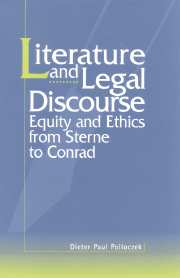Book contents
- Frontmatter
- Contents
- Preface
- Chapter 1 Introduction
- Chapter 2 Trappings of a transnational gaze: legal and sentimental confinement in Sterne's novels
- Chapter 3 Reinstitutionalizing the common law: Bentham on the security and flexibility of legal rules
- Chapter 4 Aporias of retribution and questions of responsibility: the legacy of incarceration in Dickens's Bleak House
- Chapter 5 A curse gone re-cursive: the case and cause of solidarity in Conrad's The Nigger of the “narcissus”
- Chapter 6 Conclusion
- Notes
- Index
Chapter 3 - Reinstitutionalizing the common law: Bentham on the security and flexibility of legal rules
Published online by Cambridge University Press: 22 September 2009
- Frontmatter
- Contents
- Preface
- Chapter 1 Introduction
- Chapter 2 Trappings of a transnational gaze: legal and sentimental confinement in Sterne's novels
- Chapter 3 Reinstitutionalizing the common law: Bentham on the security and flexibility of legal rules
- Chapter 4 Aporias of retribution and questions of responsibility: the legacy of incarceration in Dickens's Bleak House
- Chapter 5 A curse gone re-cursive: the case and cause of solidarity in Conrad's The Nigger of the “narcissus”
- Chapter 6 Conclusion
- Notes
- Index
Summary
The malleability of human reactions allows utilitarians to ask whether the attitudes whose gratification or frustration determines how much happiness an institution produces are more or less the effects of the institution in question
Alan Ryan, PropertyVeteres avias tibi de pulmone revello
Persius, SatiresSECURED EXPECTATIONS VERSUS UNFORCED CHOICES?
Even utilitarians, it seems, cannot do without conscience. Bentham shifts moral philosophy's focus on the opacity of conscience toward a utilitarian manipulation of character formation. Since Foucault's analysis of Bentham's Panopticon in Discipline and Punish, he has become most familiar as a reformer of penal institutions. Critics have frequently presented him as someone who channels fantasies of subjection to sublime forces into institutionalized identifications of consciousness with a social structure. The differences of opinion among critics as to the psycho-socionomic function of Bentham's penitentiary suggest that his call for transparency in matters of solitary confinement is highly ambivalent. In a recent study, Janet Semple traces these ambivalences even back to the biographical complexities reflected in his two postscripts to the letter on the Panopticon, as well as in some of the many unpublished manuscripts at University College London. Considered in the light of Bentham's approach, Yorick's incarceration fantasies, in which the prisoner's Civil Death and the spectator's conscience fuse into a spectacle of mutual character-altering inspections, emerge as the transparent institutionalized form of Smith's theater of the sympathetic gaze.
- Type
- Chapter
- Information
- Literature and Legal DiscourseEquity and Ethics from Sterne to Conrad, pp. 72 - 123Publisher: Cambridge University PressPrint publication year: 1999



